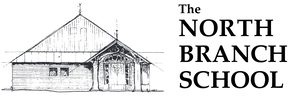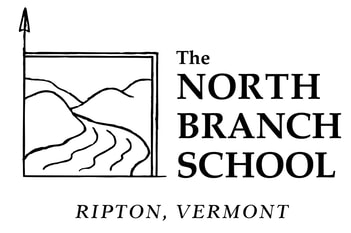A Three-Year Experience
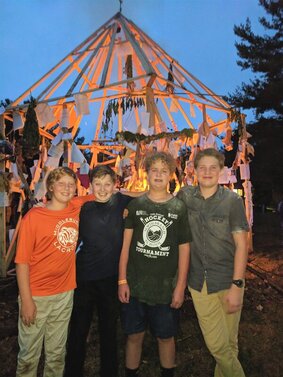
The following sketches in a general way the “journey” a student will embark upon as he/she enters The North Branch School. We have tried to suggest here the “feeling” of the school as students move through three years beginning in seventh grade.
Transition from Sixth to Seventh Grade
New students coming into the North Branch School will encounter a multi-age setting where students have a high degree of pride and responsibility in shaping the class environment. They will encounter an unusually high degree of seriousness and purpose regarding academic, community and social matters. Doing well, trying one’s hardest, and taking academic and creative risks are highly prized and consciously sought.
What new kids may initially experience is the sudden proximity to older students who’ve had a year or two building the class environment. These “old kids” are quite open emotionally, artistically, and intellectually. They are not afraid to share feelings, present a conflicting point of view, or grapple with a question to which there may be no definitive answer. Many of the issues dealt with in class are ethical, philosophical or emotional in nature. Hence, students accustomed to giving pat or standard answers will discover that they must confront not just new and complex material, but sometimes also themselves
Transition from Sixth to Seventh Grade
New students coming into the North Branch School will encounter a multi-age setting where students have a high degree of pride and responsibility in shaping the class environment. They will encounter an unusually high degree of seriousness and purpose regarding academic, community and social matters. Doing well, trying one’s hardest, and taking academic and creative risks are highly prized and consciously sought.
What new kids may initially experience is the sudden proximity to older students who’ve had a year or two building the class environment. These “old kids” are quite open emotionally, artistically, and intellectually. They are not afraid to share feelings, present a conflicting point of view, or grapple with a question to which there may be no definitive answer. Many of the issues dealt with in class are ethical, philosophical or emotional in nature. Hence, students accustomed to giving pat or standard answers will discover that they must confront not just new and complex material, but sometimes also themselves
Students will encounter a place in which the discoveries made by teachers and students are mutual. There is a palpable sense of learning together, of a collective enterprise in which each child plays an essential part. Students work to teach each other, question each other, support each other, and even enlighten teachers by example or through the suddenness of epiphany. As each student brings a unique set of talents, affinities, and learning styles, so too do these differences become strands woven into the fabric of the class community.
The school believes that a certain degree of academic, creative, and emotional tension is necessary for growth. This tension creates an environment in which students earn respect by willingly giving their particular gifts to the process and culture of learning. Socrates believed that tension in the mind was necessary so individuals could rise from the “bondage of myths and half-truths” to the greater realm of creative analysis and objective appraisal. That tension is also necessary to open ground in which the heart and mind may have the space to play and grow, and, ultimately, become an integrated whole.
The school believes that a certain degree of academic, creative, and emotional tension is necessary for growth. This tension creates an environment in which students earn respect by willingly giving their particular gifts to the process and culture of learning. Socrates believed that tension in the mind was necessary so individuals could rise from the “bondage of myths and half-truths” to the greater realm of creative analysis and objective appraisal. That tension is also necessary to open ground in which the heart and mind may have the space to play and grow, and, ultimately, become an integrated whole.
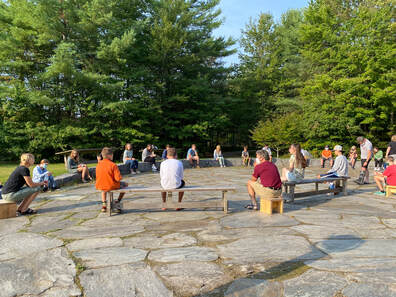
The school relishes humor, honesty, and truth-seeking. Experiences are shared, stories are told, and parallels between academic matters and our lives are continually drawn. Definitions of words and concepts are examined. Contradictions and paradoxes are discussed and debated. Assumptions are challenged, most often by the students themselves. We ask, “What do you believe?” as well as “Why do you believe it.” Students continually explore root questions and the sources of their understanding and ideas. On any given day the room is filled with questions, many for which there are no ready answers, many which require lengthy contemplation, and some which may not be able to be answered even in the space of a year or two.
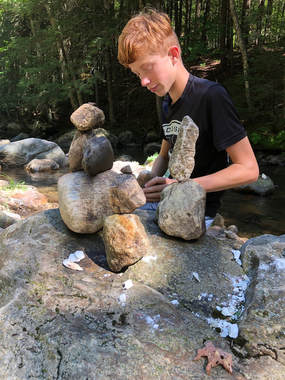
First year (7th Grade)
The first year is challenging and sometimes exhilarating. There are new and older kids, a new building, environment, and school culture. Time is spent at the beginning of the year working with the new group on what it means to them to be in a new place, with new kids, at a new stage of their lives. Importantly, new students will begin to have more responsibility for their work, and they will be in a culture of students who take great pride in their work. New students will discover that the tasks at North Branch are challenging and meaningful and that caring about one’s work is the acceptable mode.
The new students will have time together in order to “bond” as a group. The formation of a group identity is important as they begin to assimilate themselves into the school culture. They have ample opportunities for discussion, reflection, debate and processing among themselves as a way of locating themselves within the school.
The new students will do many projects, activities and “courses” as a group and with the older kids. These may include poetry workshops, issues, discussions, class conferences, literature, and social studies. The new students will also be fully a part of the larger class, particularly in the areas of class government, ethics and philosophy issues, creative writing and the class “literary community.” In particular, they are introduced to the process of autobiographical narrative writing, writing passionate and logical persuasive essays, and reading poetry and novels with depth.
We (the teachers) spend a good deal of time the first year getting to know each individual student, his or her learning style, family, and life outside of school. Having a whole year for this process creates an important foundation for the following two years. We begin to see the kids not only at their age and "level," but also over the longer developmental span. This helps immeasurably as we encourage students to deepen, take on different challenges, and respond to any difficulties or other changes.
The first year is challenging and sometimes exhilarating. There are new and older kids, a new building, environment, and school culture. Time is spent at the beginning of the year working with the new group on what it means to them to be in a new place, with new kids, at a new stage of their lives. Importantly, new students will begin to have more responsibility for their work, and they will be in a culture of students who take great pride in their work. New students will discover that the tasks at North Branch are challenging and meaningful and that caring about one’s work is the acceptable mode.
The new students will have time together in order to “bond” as a group. The formation of a group identity is important as they begin to assimilate themselves into the school culture. They have ample opportunities for discussion, reflection, debate and processing among themselves as a way of locating themselves within the school.
The new students will do many projects, activities and “courses” as a group and with the older kids. These may include poetry workshops, issues, discussions, class conferences, literature, and social studies. The new students will also be fully a part of the larger class, particularly in the areas of class government, ethics and philosophy issues, creative writing and the class “literary community.” In particular, they are introduced to the process of autobiographical narrative writing, writing passionate and logical persuasive essays, and reading poetry and novels with depth.
We (the teachers) spend a good deal of time the first year getting to know each individual student, his or her learning style, family, and life outside of school. Having a whole year for this process creates an important foundation for the following two years. We begin to see the kids not only at their age and "level," but also over the longer developmental span. This helps immeasurably as we encourage students to deepen, take on different challenges, and respond to any difficulties or other changes.
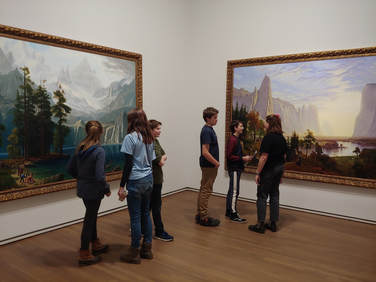
As much as any material or subject matter, we are concerned with each student’s development of an ethical self. Their autobiographical and reflective writing opens many paths of learning in this regard. Similarly, their work and involvement in the class government and community service introduces them to concepts in empathic leadership, philosophical reason, and community welfare.
Completing the first year is a wonderful rite of passage. By year’s end they will feel a deep connection to each other and to school. The end-of-the-year ceremony for the now not-so-new students focuses on their success in navigating the first year of “middle school,” and on their integration into the class community. We highlight their strengths, and we define areas into which we hope they will grow and extend themselves. They leave the first year feeling quite proud of themselves, and ready to take on the larger responsibilities of being an “old kid.”
Completing the first year is a wonderful rite of passage. By year’s end they will feel a deep connection to each other and to school. The end-of-the-year ceremony for the now not-so-new students focuses on their success in navigating the first year of “middle school,” and on their integration into the class community. We highlight their strengths, and we define areas into which we hope they will grow and extend themselves. They leave the first year feeling quite proud of themselves, and ready to take on the larger responsibilities of being an “old kid.”
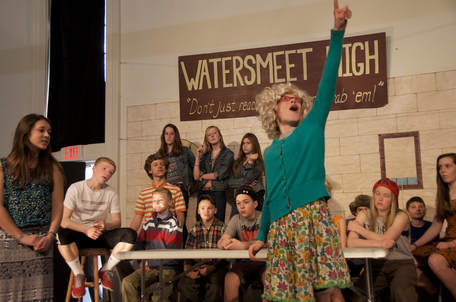
Second Year (8th Grade)
The work and excitement of the first year has enormous pay-offs in the eighth grade year. Second year kids are a full part of the class culture, and they naturally carry this experience with pride and seriousness. They begin to shoulder the responsibility of being leaders in the school, of teaching the new students the “ways” of doing things, of shaping the class government, leading class conferences on issues, establishing a vigorous work ethic and promoting the humor and traditions of the class.
The connections with peers of their “class” provide an invaluable touchstone. The previous year together in an intimate and open setting enables students to know each other in ways that are rare for kids this age. This closeness, and the efforts to promote it, provides a safe environment: and when kids feel safe, when they are all looking out for each other, then they are more able and comfortable to work to the best of their abilities. All of this provides a wonderful forum for community building, leadership and for making healthy friendships.
The second-year students have a huge role to play in helping new kids enter into the class, helping them to understand concepts and idiosyncrasies of the class, reading and editing new student’s work, passing on the history of the class, and modeling positive behavior. The older students take a large role in introducing the way the school runs—literature classes, creative writing, class conferences, class government, and the process and structure of math and science. The older kids are largely responsible for making it a safe and secure place to be, and when things don’t go exactly right, they have responsibility in mediating or seeking the solution. As their cognitive abilities expand, they begin to deepen in their ability to think abstractly and articulate the breadth of their vision and understanding.
Importantly, by the second year we (the teachers) know them extremely well—their strengths and weaknesses, their learning styles and quirks, their interests and affinities. We also have established a strong connection with the family/parents, a continuing dialogue that deepens as students grow and develop.
The work and excitement of the first year has enormous pay-offs in the eighth grade year. Second year kids are a full part of the class culture, and they naturally carry this experience with pride and seriousness. They begin to shoulder the responsibility of being leaders in the school, of teaching the new students the “ways” of doing things, of shaping the class government, leading class conferences on issues, establishing a vigorous work ethic and promoting the humor and traditions of the class.
The connections with peers of their “class” provide an invaluable touchstone. The previous year together in an intimate and open setting enables students to know each other in ways that are rare for kids this age. This closeness, and the efforts to promote it, provides a safe environment: and when kids feel safe, when they are all looking out for each other, then they are more able and comfortable to work to the best of their abilities. All of this provides a wonderful forum for community building, leadership and for making healthy friendships.
The second-year students have a huge role to play in helping new kids enter into the class, helping them to understand concepts and idiosyncrasies of the class, reading and editing new student’s work, passing on the history of the class, and modeling positive behavior. The older students take a large role in introducing the way the school runs—literature classes, creative writing, class conferences, class government, and the process and structure of math and science. The older kids are largely responsible for making it a safe and secure place to be, and when things don’t go exactly right, they have responsibility in mediating or seeking the solution. As their cognitive abilities expand, they begin to deepen in their ability to think abstractly and articulate the breadth of their vision and understanding.
Importantly, by the second year we (the teachers) know them extremely well—their strengths and weaknesses, their learning styles and quirks, their interests and affinities. We also have established a strong connection with the family/parents, a continuing dialogue that deepens as students grow and develop.
In addition to continuing the work begun the first year (class government, creative and autobiographical writing, literature, and social studies), the second year students have a few new components added to their workload. They will take on larger positions within the class government. They will continue to work on any areas needing development or extra support. They will spend a considerable amount of time setting their own learning goals and reflecting on their progress. And they will begin devising a yearlong study/mentor-ship that they will complete during their third/last (9th grade) year.
The end of the year is marked by a series of reflective writings based on what they have learned, seen, felt, and understood. The end of the year ceremony is a celebration of their achievements, and may include a public speech or reading focused on what they have learned and what they hope for their final year.
The end of the year is marked by a series of reflective writings based on what they have learned, seen, felt, and understood. The end of the year ceremony is a celebration of their achievements, and may include a public speech or reading focused on what they have learned and what they hope for their final year.
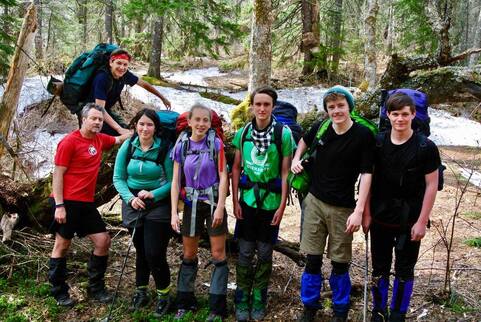
Third Year (9th Grade)
The third and final year is the culmination of a lot of exciting growth and learning. The leadership roles continue to develop, but the third year is distinguished from the first two in a number of significant ways. We work to extend their natural idealism, which is kindled by the safe and secure atmosphere of the school. As they begin to look outward, their view broadens, and, we hope, begins to extend into the world beyond them.
Most noticeably, increased autonomy granted is granted to the older kids. It is expected that they can work independently and with purpose and self-direction. This shift is manifested in the leadership roles they play in leading class conferences, mediating disputes, solving problems, and defining issues. Creative writing, which for the first two years centered around autobiographical narrative, will shift to other genres, including the formal essay, the personal essay, creative fiction and non-fiction, and exploratory creative writing. Students with the desire and initiative may undertake an independent writing project, focusing, for instance, on poetry, science fiction, or intensive journaling.
There will also be an increased focus on self-reflection and developing and articulating a personal philosophy. Third year students pursue in depth the questions they have been asking and examining for the first two years. Part of this exploration involves having them write philosophies of learning and knowledge, innocence and experience. These written explorations will be a culmination and synthesis— their final “sculptures” based on themselves and the material they have encountered in their time in the school.
The third and final year is the culmination of a lot of exciting growth and learning. The leadership roles continue to develop, but the third year is distinguished from the first two in a number of significant ways. We work to extend their natural idealism, which is kindled by the safe and secure atmosphere of the school. As they begin to look outward, their view broadens, and, we hope, begins to extend into the world beyond them.
Most noticeably, increased autonomy granted is granted to the older kids. It is expected that they can work independently and with purpose and self-direction. This shift is manifested in the leadership roles they play in leading class conferences, mediating disputes, solving problems, and defining issues. Creative writing, which for the first two years centered around autobiographical narrative, will shift to other genres, including the formal essay, the personal essay, creative fiction and non-fiction, and exploratory creative writing. Students with the desire and initiative may undertake an independent writing project, focusing, for instance, on poetry, science fiction, or intensive journaling.
There will also be an increased focus on self-reflection and developing and articulating a personal philosophy. Third year students pursue in depth the questions they have been asking and examining for the first two years. Part of this exploration involves having them write philosophies of learning and knowledge, innocence and experience. These written explorations will be a culmination and synthesis— their final “sculptures” based on themselves and the material they have encountered in their time in the school.
In addition to the philosophical, emotional and ethical development outlined above, by the time they have completed their third year, students will have developed remarkable proficiency in the written and spoken word. They will have had experience in or mastered numerous genres of writing, including autobiographical narrative, journal, poetry, persuasive essay, and the self-reflective writing. They will have examined in depth many forms of literature, including the novel, short story, poem, play, folk-tales, children’s literature, and mythology. They will have surveyed world history, Vermont history, Colonial and U.S. Constitutional history, American history, selected topics in American history (African American, Native American, and women’s history), art history, comparative religion, and a study of the Holocaust, with extensive exposure to the use and importance of primary sources. They will have navigated a three- year advance in mathematics and gained broad exposure to disciplines in science. In short, they will be more than ready for their next steps in their school experience.
The end of the year ceremony concludes with the third-year students’ graduation. They will each speak, read, or perform, and teachers will speak and read about them. The event is a joyous celebration of the school, of learning and growing, and of the kids themselves.
The end of the year ceremony concludes with the third-year students’ graduation. They will each speak, read, or perform, and teachers will speak and read about them. The event is a joyous celebration of the school, of learning and growing, and of the kids themselves.
For a complete guide to the current three year curriculum taught at NBS, please contact the school.
